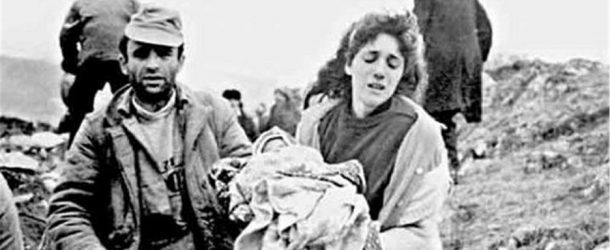The 20th century witnessed the perpetration of crimes and emergence of universal threats and challenges. It is the past century when humanity was brought face to face with fascism, racism, xenophobia, apartheid, genocide, international terrorism and different phobias, particularly Islamophobia and Turkophobia, which have recently been growing. The last century went down in history as a century of two world wars, millions of deaths and the use of the atomic bomb. The 20th century witnessed one of the large-scale outbreaks of national, religious and racial discrimination in human history. Crimes against humanity encouraged the emergence of a world order dominated by the killing of millions of innocent people and national, religious and ethnic phobias. Unfortunately, all these events challenging humanity are associated with the Western world, Europe, which is considered an example to the rest of the world.
It is a fact that practical steps to bring the perpetrators of crimes against peace and humanity to justice were for the first time taken after the World War Two. The international community then had high hopes of eliminating fascism, racism, and addressing the global challenges peacefully. But what happened at the end of the last century and at the beginning of the new millennium showed that the world did not learn it lesson. Some countries have religious, national and ethnic discrimination even at the level of state policy. And one of the harshest realities and biggest challenges nowadays is the growing Islamophobia and Turkophobia in the West.
The West`s efforts to rebuild the political architecture of the Near and Middle East put humanity face to face with a global migration crisis. Unfortunately, both political and academic circles and civil society in the West took a double standard attitude towards migrants, labelling Muslim migrants as a threat to the future and values of the West. It is no coincidence that in the past 15-20 years the Western media have portrayed migrants coming from Muslim countries as potential criminals. Current anti-immigration policy once again proved that for the West democracy is good only when it meets its interests. Some European officials say “Stop Islam”. Others express readiness to receive migrants, but not Muslims. And this undermines global confidence in justice, and plays into the hands of different radical forces.
Islamophobia and Turkophobia, one of the trends in the everyday life in the West, manifested itself in the most violate manner in Azerbaijan late last century. Genocide committed by the Armenians in the town of Khojaly in Azerbaijan`s Karabakh district on the night of 25-26 February 1992 is a clear manifestation of Turkophobia and hostility towards Turks. There were Meskhetian Turks among the Azerbaijani Turkish population in Khojaly, and the only reason why they were killed is that they were Turks.
Khojaly was the next victim of the Armenian terrorism. The term “Armenian terrorism” as an independent definition of the entire spectrum of contemporary social studies was coined by American Andrew Corsun, a member of the Bureau of Diplomatic Security’s Threat Analysis Division (DS/TAD), US Department of State.[i] “The Armenian terror” is the only instance in the world when terror is associated with a separate nation. This is because for several centuries the Armenians have been systematically perpetrating terror attacks in different countries in order to reach their political goals. The Armenians have committed terror attacks at the time of the Ottoman empire, Tsarist Russia and Soviet Union, in Georgia and Azerbaijan, and have maintained close ties with all international terrorist organizations in the Middle East.
Khojaly residents who were subjected to genocide are also the victims of the Armenian terror. Armenian terrorist organization ASALA and Arabo terrorist group consisting of radical Armenian terrorists from Lebanon and other countries of the middle East were especially actively involved in the perpetration of the atrocities. Representatives of the military junta which now rules Armenia were personally in Khojaly that night. Led by Serzh Sargsyan, this junta confessed to committing Khojaly massacre. In addition, they even feel proud of their atrocities.
Apart from being the extreme example of hostility towards Turks, Khojaly genocide is one of the most terrible acts of vandalism in human history.
It should be noted that Turkophobia, which is supported by superpowers and in which Armenia is used as tongs, is not a new experience as its manifestations have been occurring throughout history, increasing and decreasing from time to time. Under the patronage of different foreign forces, the Armenians committed large-scale massacres in the region in the early 20th century. In 1905-1907 and in 1918, the Armenian armed groups committed unprecedented atrocities against local Turkish and Muslim population in different regions of Azerbaijan – Baku, Quba, Nakhchivan, Shamakhi, Zangazur, in the Georgian regions of Borchali and Akhalkalaki, and in Western Anatolia. Unfortunately,
Unfortunately, unpunishability of those who violate law and commit crimes as well as double standards in the world paves the way for a repetition of such tragic events.
Azerbaijan has been working tirelessly to ensure global recognition of this genocide. Launched by vice president of the Heydar Aliyev Foundation Leyla Aliyeva, “Justice for Khojaly” campaign aims to make Azerbaijan`s just cause known to the world.
The parliaments of 12 countries have adopted resolutions and proclamations recognizing Khojaly genocide: Mexico in 2011, Pakistan and Colombia in 2012, Czech Republic, Bosnia and Herzegovina, Peru, Panama and Jordan in 2013, Sudan and Honduras in 2014, Guatemala in 2015, Djibouti in 2017.[ii] The Organization of Islamic Cooperation officially recognized Khojaly genocide.
Arastu HABIBBEYLI
Deputy head Department of Foreign Relations
Administration of the President of the Republic of Azerbaijan
[i] Oleg Kuznetsov. The history of transnational Armenian terrorism in the twentieth century. Berlin, 2016.p.14

























































